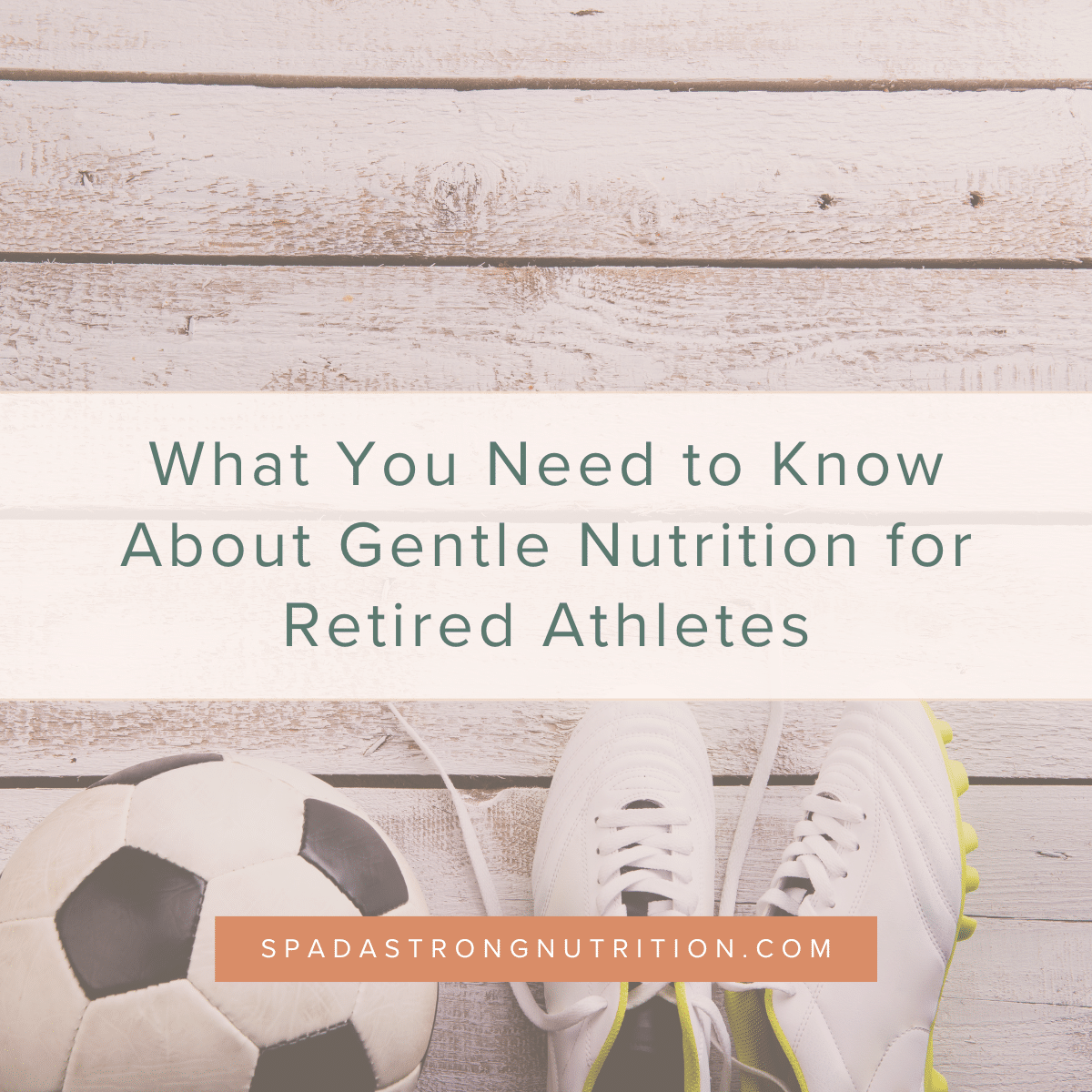How would you describe your relationship with food after retiring from sport? If you feel the need to count or track calories or macros, constantly avoid “bad” or “unhealthy” foods or stick to a regimented workout routine in order to “make up” for what you ate, then it’s likely that your relationship with food feels mentally and physically taxing.
Many athletes leave sport feeling unsure of what’s next and uncomfortable with the changes their body makes now that they are no longer working out for hours everyday. It’s common to turn towards restrictive eating habits in retirement. Which turns into a vicious all or nothing cycle where you either have to eat completely clean or else you will feel completely out of control around foods, like sweets. In this article I am going to share more about why restricting yourself around food is not beneficial as a retired athlete. I will also be sharing a different approach – Gentle Nutrition – that has helped many retired athletes find balance between nourishing foods and including fun foods.

The Problem with Restriction
You may already have an idea of how overwhelming restrictive eating can be. You’ve likely tried eating super clean, but have been left feeling ravenous and out of control around food. You might even be successfully staying within your calories or macros and working out for hours every day. But with both of these comes either physical or mental repercussions.
If you are avoiding “fun” foods and forcing yourself to eat only fruits and vegetables, you might experience the physical restrict-binge cycle where you are able to stick to it for awhile, but then find yourself feeling out of control with those foods later and then starting over again the next day. Mentally, you might find yourself thinking about food 24/7 or skipping out on things either to avoid food or to make a workout.
Research has shown that restrictive eating behaviors like dieting, cutting out food, calorie counting, macro tracking and more can lead to food preoccupation, more intense hunger and food cravings, overeating, emotional eating and binge eating as well as compensatory behaviors to make up for it – such as purging, over exercising or jumping on another diet.
What is Intuitive Eating?
Now that you can see why clean eating and obsessively tracking food isn’t helpful for long-term health, let’s dive into another approach: intuitive eating. Intuitive eating is described by Evelyn Tribole and Elyse Resch (the authors and creators of Intuitive Eating) as “a new way of eating that is ultimately struggle-free and healthy for your mind and body”. This approach to eating focuses on 10 Principles:
- Reject the Diet Mentality
- Honor your Hunger
- Make Peace with Food
- Challenge the Food Police
- Discover the Satisfaction Factor
- Feel Your Fullness
- Cope with Emotions with Kindness
- Respect your Body
- Movement – Feel the Difference
- Honor your Health – Gentle Nutrition
These principles, when implemented correctly, can create a peaceful and healthy relationship with food. It allows you to make food choices that allow you to honor your health – mentally and physically. This is the approach that I take with my clients who have found the balance between enjoying “fun” foods without guilt, shame or losing control and nourishing their body with nutrient dense foods without feeling like they have to force themselves to eat them.

Why Can Intuitive Eating Benefit a Retired Athlete?
Research shows that Intuitive Eaters have less disordered eating behaviors, such as emotional eating and binge eating. They are also likely to have higher self-esteem, body appreciation and life satisfaction. However, there are also physical health benefits seen in Intuitive Eaters such as, lower triglycerides and blood pressure and higher HDL (good) cholesterol. The best part, though? One study showed that intuitive Eaters are likely to eat more variety of nutrient dense foods because they are actually craving them.
An open-ended study of over 218 female retired athletes looked at the impact of intuitive eating on their relationship with food. They focused on 3 main principles of intuitive eating – “permission to eat, recognizing internal hunger and satiety cues, and eating to meet physical and nutritional needs”. After implementation, the female athletes “described feeling liberated with regards to their eating following retirement from sport, and for some this included an alleviation of disordered eating practices”.
Where Does Gentle Nutrition Come In?
As you now know, the last principle of intuitive eating is gentle nutrition. Gentle nutrition is known as “Making food choices that honor your health and taste buds while making you feel good” according to the Intuitive Eating website.
The reason this principle is so helpful for retired athletes is because it gives them confidence in making food choices based off preference and satisfaction, trust in honoring their innate cues of hunger and satiety and the ability incorporate nutrition to ensure they are fueling their bodies properly. A common misconception about intuitive eating is that it is throwing your health out the window. This could not be further from the truth. Gentle nutrition is giving you the opportunity to make healthful choices without restriction or obsession. You are able to fuel your body while still enjoying the foods you love and living your best life.
Gentle Nutrition Takeaway
Restrictive eating, binge eating and over exercising is common for retired athletes, but it doesn’t have to be the way you choose to live your life. The intuitive eating approach gives you the chance to get back to taking care of your body and your health in a way that feels liberating and sustainable long-term. My clients who have chosen to start this journey would tell you that their life has changed for the best. You can check out testimonials from others who have taken this journey here.
If you are a former athlete who has been struggling with food in life after sport. Maybe you’re wanting to just eat normally and improve body confidence so you can THRIVE in life after sport! If so, I created a 48 page, comprehensive e-book “The POWER Bundle” was created specifically with you in mind. In this e-book, you will walk through my signature 5-pillar process (POWER). This is the exact one I use with all of my clients! It’s loaded with guided exercises, journal prompts and MORE so you start feeling more confident about food and your body as a retired athlete.
